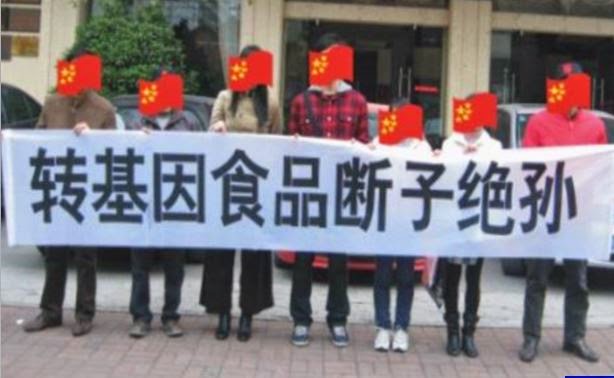Tailoring Fear to Terrorize Your Audience
It has been widely shown that the anti-GMO movement does not have evidence to support their position. In the absence of science, biotech opponents must resort to misinformation and fear in order to achieve their goals.
Today a report surfaced about
It reminded me of a post I produced last year. In China, GM cotton has been used for over a decade and the technology has brought tremendous advantages. In 2003, the use of Bt cotton stopped over 300,000 tons of insecticide from being applied (Pam Ronald, Tomrorow's Table). The technology is doing well, and today there is a great discussion among Chinese scientists about the technology-- and they are for the development of such products.
However, the anti-GM movement has effectively manipulated Chinese citizens. In the USA, you scare people by telling them they'll be fat and packed with tumors like a 2-year old Sprague Dawley Rat.
In China, you need to tell them that they won't be able to have children. With rules on family size, there is a tremendous feeling of desperation to have that one healthy child. Something like 12.5% of Chinese couples are unable to conceive, and it carries a social stigma. Unregulated IVF clinics abound. It is not known why Chinese families are infertile, but experts point to pollution, stress and planning families at later ages.
So what message will Greenpeace and other activist corporations use in China? Eating GMO will make you infertile.
A few years ago, Xiaoyu Wang from the Hilongjiang Soybean Association publicly stated that GM soy would cause sterility and cancer, of course, without evidence. Oh, and the Hilongjiang Soybean Association only produces non-GM soy.
There also are claims that citizens of the USA do not eat GM products and that these technologies are a "soft bomb" way to harm China.
Clearly it is all tailored rhetoric, carefully crafted for maximum manufacture of perceived risk. It shows that biotech opponents will stop at nothing to hurt people and limit options, as long as their agendas are met.
Today a report surfaced about
It reminded me of a post I produced last year. In China, GM cotton has been used for over a decade and the technology has brought tremendous advantages. In 2003, the use of Bt cotton stopped over 300,000 tons of insecticide from being applied (Pam Ronald, Tomrorow's Table). The technology is doing well, and today there is a great discussion among Chinese scientists about the technology-- and they are for the development of such products.
However, the anti-GM movement has effectively manipulated Chinese citizens. In the USA, you scare people by telling them they'll be fat and packed with tumors like a 2-year old Sprague Dawley Rat.
In China, you need to tell them that they won't be able to have children. With rules on family size, there is a tremendous feeling of desperation to have that one healthy child. Something like 12.5% of Chinese couples are unable to conceive, and it carries a social stigma. Unregulated IVF clinics abound. It is not known why Chinese families are infertile, but experts point to pollution, stress and planning families at later ages.
So what message will Greenpeace and other activist corporations use in China? Eating GMO will make you infertile.
The sign says, "GMO food will make people unable to reproduce", playing into their greatest fears. A tailored message to maximize negative public sentiment.
Back in 2000 the technology was viewed favorably, and the Chinese government rushed forward with development of corn and soy genetics. China imports most of its corn and soy from Argentina and Brazil. Today, the fear has worked, turning many against the technology.
A few years ago, Xiaoyu Wang from the Hilongjiang Soybean Association publicly stated that GM soy would cause sterility and cancer, of course, without evidence. Oh, and the Hilongjiang Soybean Association only produces non-GM soy.
There also are claims that citizens of the USA do not eat GM products and that these technologies are a "soft bomb" way to harm China.
Clearly it is all tailored rhetoric, carefully crafted for maximum manufacture of perceived risk. It shows that biotech opponents will stop at nothing to hurt people and limit options, as long as their agendas are met.


